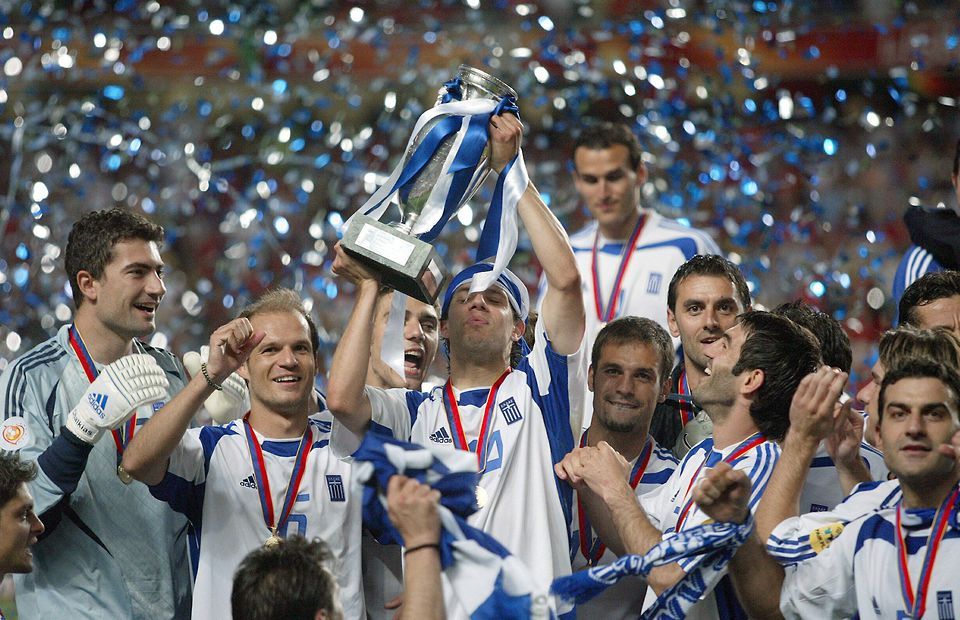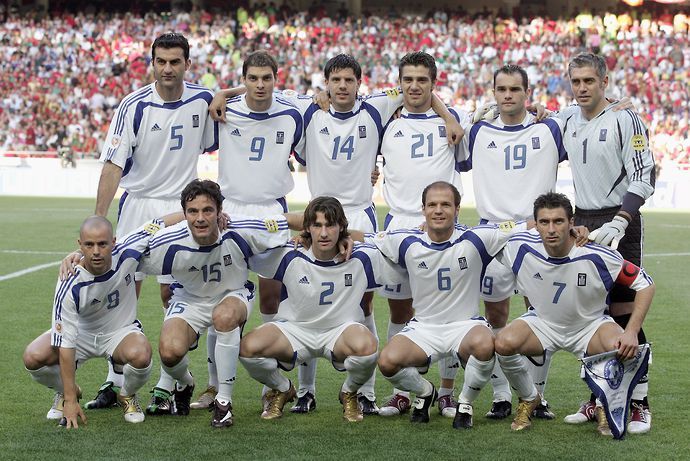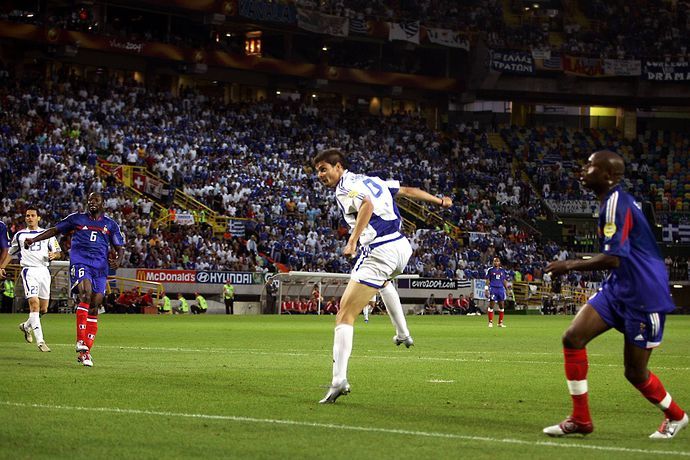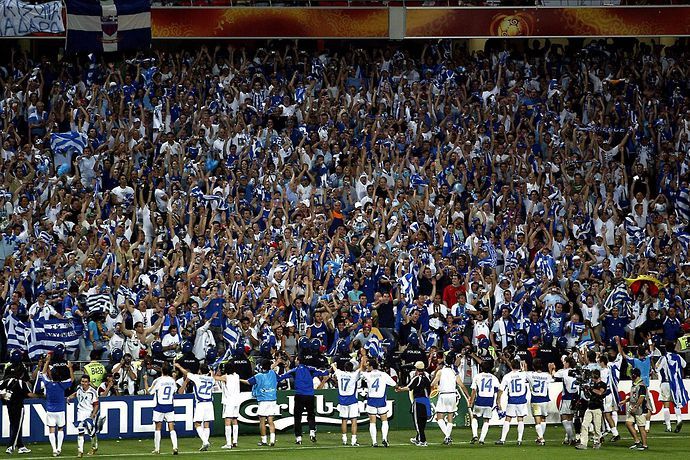Unless you’re a fan of trance music, the name Three Drives On A Vinyl will likely not mean anything to you.
By far and away the Dutch duo’s biggest hit was Greece 2000, which was confusingly released some three years earlier.
Why does this all matter? Well, it would appear before the predictions of Paul the Octopus, we had Three Drives.
Granted they might have got the number a few years out, but the foresight is there.
A repetitive pattern. A feeling of dreaming. No words.
Otherwise known as Greece 2004.
Even with context, it’s difficult to describe how incredible Greece’s triumph at the 2004 European Championships was.
Greece’s last major tournament, the 1994 World Cup, ended in a group stage exit yielding zero points or goals. Their only other qualification, the 1980 Euros, also failed to produce a single win.
As if to signify the lack of hope in the team, bookies gave them a 150/1 chance of clinching the trophy. You could get similar odds on Latvia.
Part of the reason was Greece’s group, which contained hosts Portugal, Russia and Spain. Not an ideal fixture list for a country yet to win a single tournament match.
Then there was the squad, which contained no big stars. On paper the most recognisable names (pre-tournament) were Bolton’s Stelios Giannakopoulos, Giorgos Karagounis of Inter, and former Leicester midfielder Theo Zagorakis.
With hindsight, the fact Greece won six of their eight qualifiers to top their group, including beating Spain 1-0 in Zaragoza, might have alluded to something greater.
However, facing Portugal in the tournament’s opening game, the stage was set for the hosts. With the new Estádio do Dragão gleaming proudly, this was to be their time.
Then within seven minutes Paulo Ferreira had given the ball away to Karagounis. The midfielder took a few touches, shot low from range, and put Greece 1-0 ahead.
Early in the second half Angelos Basinas doubled the lead from the spot to compound Portugal’s worst nightmare.
Even with Cristiano Ronaldo and Deco coming off the bench, the hosts could only respond with an injury-time header through Ronaldo.
The elusive victory secured, Greece’s squad reportedly stayed up the entire night watching the match over and over, listening to radio reaction from back home.
Coach Otto Rehhagel described it as “the biggest win of any Greek team, ever.” He would have to revise that statement several times over the next few weeks.
A draw with much-fancied Spain was then followed by a 2-1 loss to Russia, and Greece narrowly squeezed through in second ahead of the Spanish, on goals scored.
The reward for these exploits was perhaps their toughest test, a quarter-final against reigning champions France.
Greece started the brighter, with Kostas Katsouranis seeing an effort blocked on the line by Fabien Barthez early in the first half.
Whilst France grew into the game, they could not force a way through the resolute defence plus goalkeeper Antonios Nikopolidis.
Just past the hour mark, Zagorakis got the ball on the right-hand side. Lifting it over Bixente Lizarazu, he crossed to Angelos Charisteas in the middle. A bullet header, and Greece were in the lead.
Holding firm to the final whistle, Charisteas reflected by saying: “this is the greatest moment in Greek football.” It wouldn’t take long to be topped.
The golden generation of the Czech Republic stood in between Greece and the improbability of another match against Portugal, this time in the final.
Back in Porto, for the first time in the tournament, Greece failed to score in 90 minutes. Despite some scares from Jan Koller and Tomáš Rosický, the same applied to the Czechs.
Deep into the first period of extra time, defender Traianos Dellas lost his marker to head home a Basinas corner. A silver goal, it gave the Czechs next to no time to reply.
Even at this stage, having beaten three tournament favourites, people still didn’t believe Greece could win the Euros.
Key man Karagounis was suspended for the final and the Estádio da Luz crowd expected a celebration. After all, they were playing Greece.
At the time Portugal had never won an international trophy. By the end of the night, Greece had.
It’s no accident the victory came the way it did. Absorption of attacks was countered by another header from Charisteas, yet again off a corner from Basinas.
In response, Portugal surged forward as Greece once again went into defensive mode. In total the hosts had 17 shots, but not one of them found the back of Nikopolidis’ net.
As a young Ronaldo was brought to tears at full time, cries of joy exited the bodies of every Greek player as they collapsed to the turf in unison.
Whilst Athens was lit up with fireworks and hundreds of thousands partied on the streets into the early hours, the rest of Europe was not so pleased.
Many were critical of Rehhagel’s tactics, which they felt sucked any life from Greece’s games. In The Guardian, Barry Glendenning described the champions as “the only underdogs in history that everyone wants to see get beaten.”
However, in reality, Greece’s triumph was a masterclass from ‘King Otto’.
Just like when he won the Bundesliga in 1998 with newly-promoted Kaiserslautern, he utilised the players at his disposal in the best way to win football matches.
Despite showing what a team in its truest sense can achieve, Zagorakis was named best player. Considering the names also in attendance, for this award to go to a 32-year-old playing for AEK was just ridiculous.
Afterwards, Greece changed their home kit from blue to white, although it hasn’t brought them much luck since - they haven’t qualified for a tournament since 2014.
This summer they’ll sit and watch from home once again, but you can bet not one Greece fan would trade a place now for what happened that summer in 2004.
In simple terms, it will forever remain the greatest shock in international football history.






















